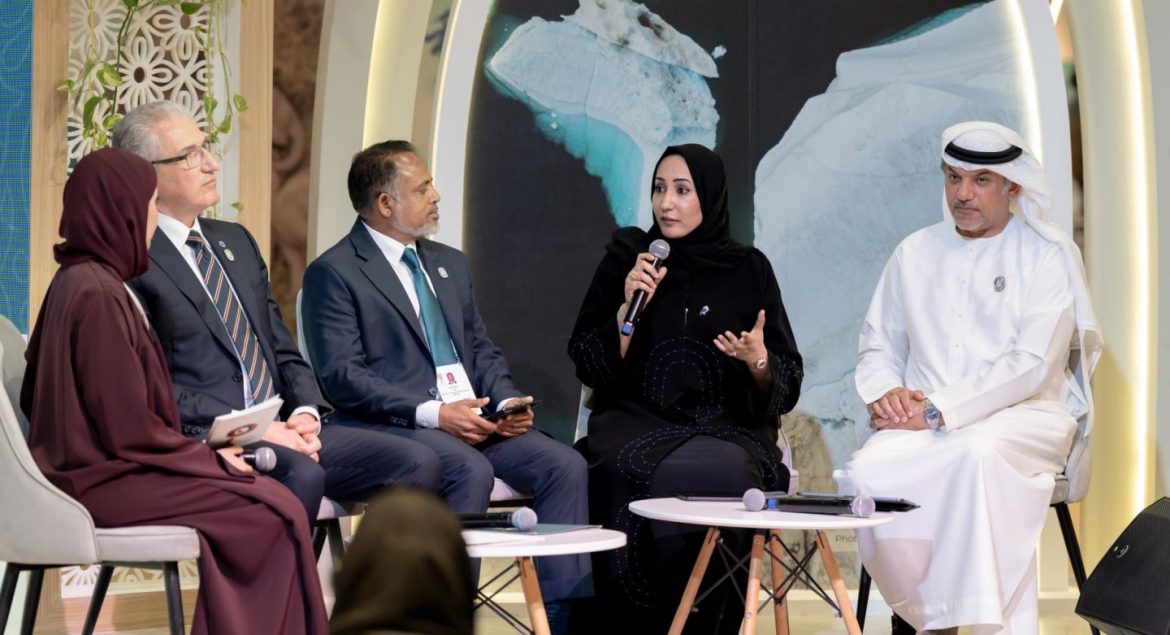The Ministry of Climate Change and Environment (MOCCAE) today demonstrated the United Arab Emirates’ unwavering commitment to a nature-positive future during a series of high-level engagements at the IUCN World Conservation Congress in Abu Dhabi.
The IUCN Central Stage hosted a forward-looking Ministerial Panel “From Vision to Execution: Leveraging Technology for Nature-Positive Outcomes”. The panel discussion provided a platform for sharing perspectives on how technological innovations can be integrated into national priorities and global partnerships and featured impactful interventions by Her Excellency Dr. Amna bint Abdullah Al Dahak, Minister of Climate Change and Environment of the UAE; His Excellency Mukhtar Babayev, Minister of Ecology and Natural Resources of Azerbaijan; His Excellency Juan Carlos Navarro, Minister of Environment of Panama; and His Excellency El Hadji Abdourahmane DIOUF, Minister of Environment and Ecological Transition of Senegal. The exchange highlighted emerging directions and extended an open invitation for collaboration in advancing the next phase of collective action for nature.
Her Excellency Dr. Amna bint Abdullah Al Dahak, delivered impactful remarks at the Ministerial Panel Discussion. Her Excellency highlighted the UAE’s proactive stance in utilising advanced tools and fostering collaboration to achieve environmental goals.
“The UAE is deeply committed to translating our vision for a nature-positive future into actionable strategies, leveraging the power of technology, from AI to earth observation, to drive measurable results,” stated Her Excellency Dr. Amna Al Dahak.
“Our national efforts are amplified exponentially through shared knowledge, best practices, and collective investment. We must move beyond isolated initiatives and build robust networks that connect governments, scientists, innovators, the private sector, and local communities to truly harness technology for biodiversity conservation, climate resilience, and sustainable development.”
Earlier in the day, His Excellency Mohammad Saeed Al Nuaimi, Undersecretary of the Ministry of Climate Change and Environment, addressed the panel discussion titled “Integrating Water, Climate, and Biodiversity Actions: Accelerating SDG Implementation for Nature and People.”
The UAE SDG Secretariat and Environment Agency – Abu Dhabi co-sponsored this high-level panel. It brought together leaders from the third group of Global Councils (each focused on one of four specific Sustainable Development Goals) to discuss how these interconnected goals could be implemented together, exploring shared benefits, challenges, and new opportunities.
His Excellency elaborated on the UAE’s innovative governance models and the synergistic benefits of integrated environmental policies.
“The UAE firmly believes that addressing the interconnected challenges of environmental degradation, climate change, and biodiversity loss demands an integrated approach,” commented His Excellency Mohammad Saeed Al Nuaimi.
“Our unique UAE Global SDG Council model fosters cross-sectoral dialogue and collaboration, , affirming that SDG 15 (Life on Land) is fundamental to achieving both climate action (SDG 13) and marine sustainability (SDG 14), This holistic approach, exemplified by initiatives like mangrove rehabilitation, maximises co-benefits and is crucial for achieving the 2030 Agenda for both people and nature.”
Her Excellency Hiba Obaid Alshehhi, Acting Assistant Undersecretary of Biodiversity and Marine Life Sector at MOCCAE, contributed as a speaker to the “Waste Meets Water: Stories, Solutions, and Strategies for Living Rivers” panel discussion.
Her Excellency’s remarks focused on implementing effective source-to-sea strategies and applying circular economy principles to protect freshwater ecosystems and enhance community resilience.
Her Excellency Hiba stated: “Targeted river clean-up and remediation efforts are highly effective. Our partnership with UNDP in Indonesia, for example, aims to remove 5,000 tonnes of plastic from six riverine areas. Robust data and monitoring are essential for identifying pollution hotspots, tracking waste flows, and accurately measuring intervention effectiveness. Furthermore, cross-sectoral collaboration among governments, waste management companies, utilities, environmental organisations, and local communities across the entire river basin is critical, a principle exemplified by UNDP’s work in Indonesia in tailoring waste management to local demands.”
The Ministry of Climate Change and Environment’s engagements underscored the UAE’s leadership in driving global environmental action, emphasising the importance of technology, cross-sectoral partnerships, and integrated policy frameworks in achieving sustainable development and a nature-positive world.




